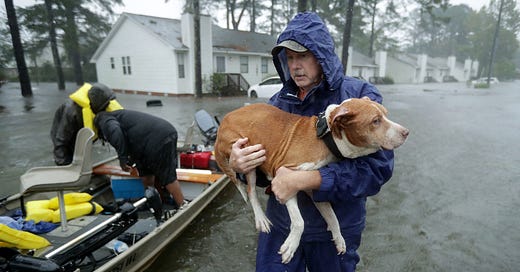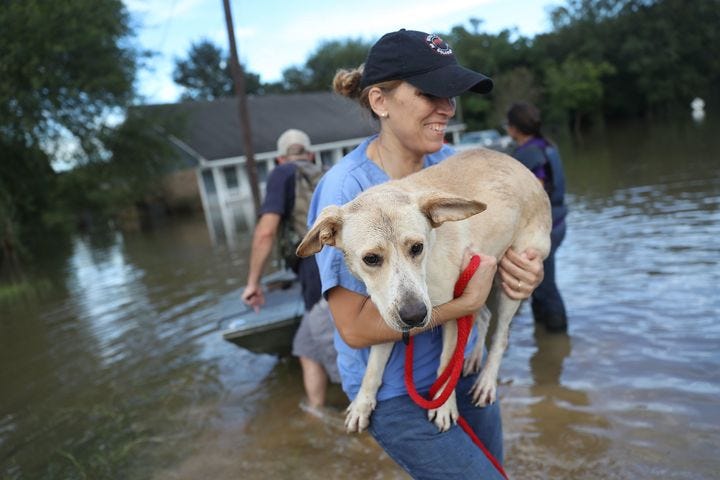As Printed OPED:
The Urgent Need for Spay and Neuter Initiative in Light of Recent Hurricanes and Homeless Pets.
The crisis of companion animals entering shelters in the United States has intensified, especially in the aftermath of recent hurricanes. Each year, approximately 6.5 million animals, including beloved pets and strays, find refuge in shelters, with around 3.3 million being dogs. This alarming influx highlights the urgent need for effective strategies to combat shelter overpopulation, particularly as natural disasters exacerbate the situation.
Implementing and supporting spay and neuter programs are essential in this fight. These initiatives offer accessible and affordable services to pet owners, enabling them to manage their animal populations and prevent unplanned pregnancies. By increasing the availability of spaying and neutering, communities can proactively address pet overpopulation, thus alleviating the burden on shelters and improving overall animal welfare.
Collaboration among animal welfare organizations, veterinary professionals, policymakers, and community leaders is crucial for creating systemic changes that prioritize animal welfare and reduce euthanasia rates. Advocating for spay and neuter legislation and expanding access to affordable veterinary care are vital steps in this process. Additionally, partnerships to promote adoption and responsible pet ownership must be fostered.
The ongoing challenges of shelter overpopulation and euthanasia demand a collective societal effort to protect companion animals. Legislative support and public education are essential. Raising awareness about the importance of spaying and neutering can prevent unplanned litters and reduce shelter intake, ultimately minimizing the need for euthanasia. Education campaigns that encourage adoption from shelters rather than purchasing from breeders are equally important in combating overcrowding.
Despite efforts to promote animal welfare, nearly 1 million shelter animals, primarily dogs and cats, are euthanized each year, underscoring the need for comprehensive solutions. Enhancing education and advocacy efforts aimed at responsible pet ownership is critical. By informing the public about the importance of spaying and neutering, communities can help alleviate pressure on shelters and save lives.
Promoting responsible pet ownership includes emphasizing the long-term commitments involved in caring for a pet. Public campaigns should focus on the resources—time, financial, and emotional—that pet ownership requires. This approach can reduce the number of animals surrendered due to neglect or inability to provide adequate care.
Partnerships with local schools and organizations can instill values of empathy and responsibility toward animals from a young age. Incorporating animal welfare education into school curricula can foster a culture of stewardship, leading to more responsible future pet owners.
In conclusion, addressing the crisis of companion animals in shelters requires a multifaceted approach, particularly in the wake of recent hurricanes. Effective spay and neuter programs, collaborative stakeholder efforts, and robust public education initiatives are essential. By recognizing our collective responsibility to protect companion animals and taking proactive measures, society can work toward a future where every animal has a loving home. Comprehensive strategies that combine education, advocacy, and community involvement are vital for mitigating shelter overpopulation and reducing the number of innocent lives lost each year.
Paul Barthel is a business owner, founder of Animal Humane Advocacy, and published author who writes about the fair and ethical treatment of animals.






Additionally, communities fall victim to these highly organized “transports” who move in quickly, set up shop. Wings of Rescue, ASPCA and even Best Friends are waiting in the wings for hurricanes, fires, tornadoes. They immediately start on social media begging for money-all day long— raising millions and moving dogs FAST, before owners can claim…move them all over the country, dogs literally disappear into high kill shelters. There is ZERO TRANSPARENCY. from these organizations -Best Friends, Wings of Rescue, ASPCA.
They use these disasters, the chaos of devastated families and orphaned animals as fundraising cash cow opportunities. In LA after the fires- Best Friends /Wings of Rescue was part of a debacle that sent dogs to Dallas Texas- that fosters in LA WANTED TO ADOPT! Adopters were denied and lied to- they were told the dogs already had “families waiting for them on the tarmac” when they arrived. Instead, there were no families, and just as they had preplanned- dogs were checked in the Dallas shelter for days-then taken to a highly publicized adoption event commending themselves for saving “LA fire dogs” and yes, many adopted. We have the entire paper trail. They actually displaced the hundreds of dogs ALREADY at the shelter waiting for homes. Wonder how many were euthanized later? We also know at least $45,000 was given for this transport by a local charity. Huge paycheck on every transport. Despicable manipulation on so many levels.
Dogs are used as disposable fundraising props. It’s been happening since Hurricane Katrina. In most cases, once that plane leaves the tarmac the dogs are gone… often sent to high kill shelters- no news of them again.. FYI- there are no cities in the US that aren’t suffering from a pet overpopulation problem right now, musical chairs with dogs does not solve or help the problem. The dogs are gone- never given a second thought and they are on to begging for money again for the next transport.
Rinse and repeat as many times as possible during a single disaster.